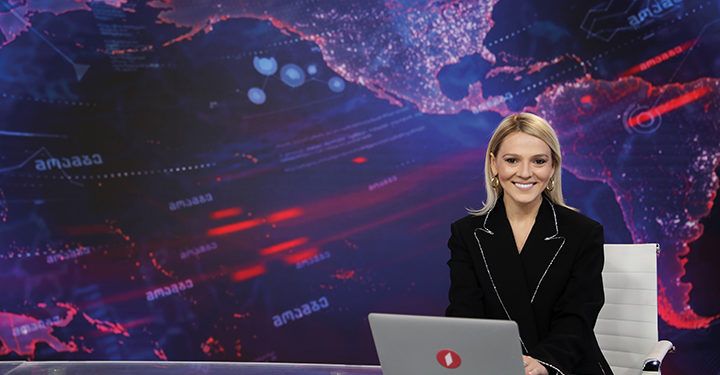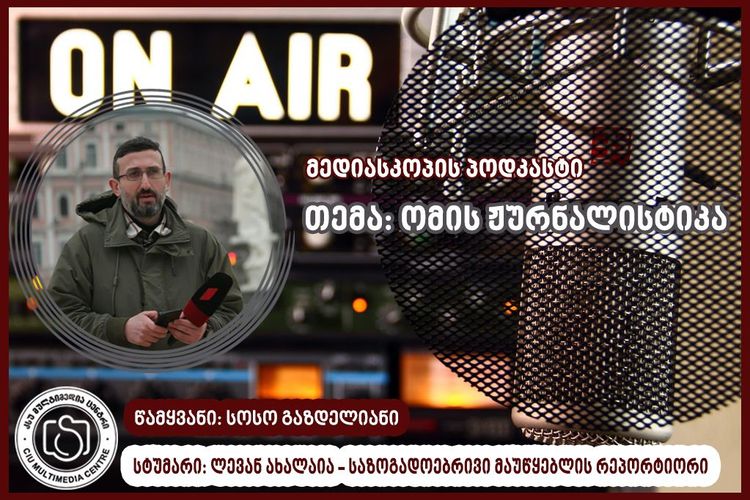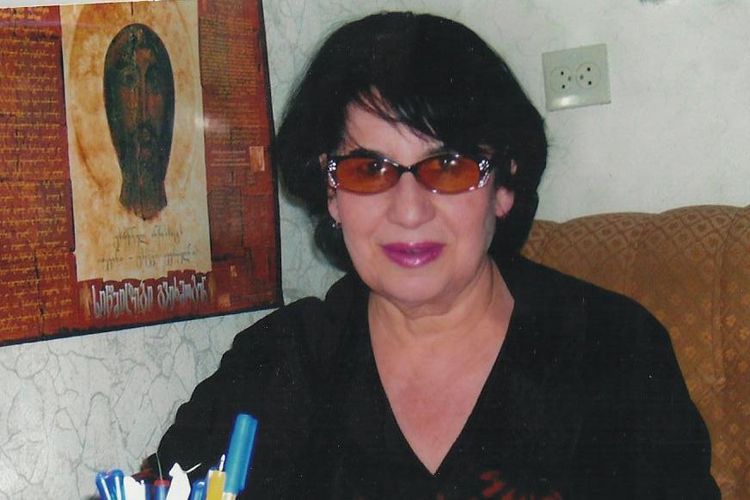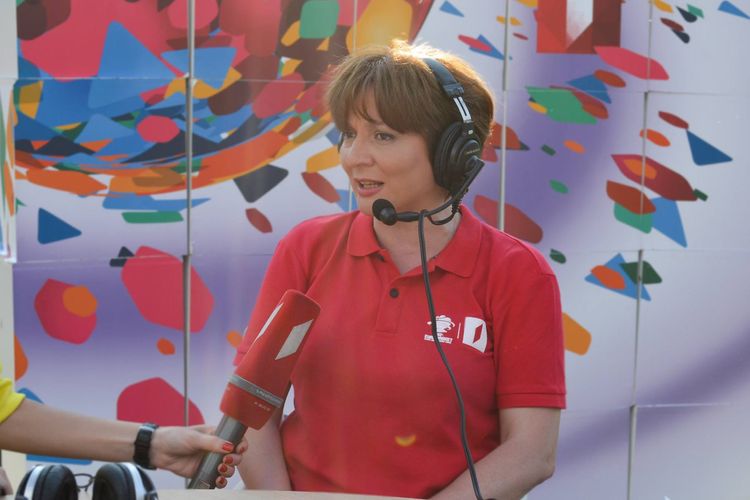Safe Media Outlets as a Guarantor of Public Welfare

Some media outlets are often destructive to society: offering them a turbulent flow of information that carries sensational, narrow-minded political ideology and mercantile goals which remain beyond ethical norms.
Safe, constructive media outlets, by their very nature, confront these important violations and show the public that it is possible to provide information to them even without causing panic and confusion.
“The existence of safe and constructive mass media is becoming even more important in today's reality against the background of technology development, high competition and fake news as the main challenge of the media,” stated Tamta Sanikidze, journalist and host of the Georgian First Channel News Bulletin “Moambe”. According to her, the media often becomes a source of spectators’ psycho-trauma and not a provider of information.
CIU Multimedia Center offers an extensive interview with Tamta Sanikidze, a journalist of the Public Broadcaster, about safe media.
Safe Media Model - How do you envisage the functions of this type of medium and its existence?
I envisage the role and functions of safe and constructive media are as follows:
Unbiased, objective and neutral coverage of the current events in the country;
Reflecting the positions of all parties and offering them to the audience;
In-depth search of the problem without a political context;
Coverage of events in a way that does not have a negative impact on human health and psychics;
Concentrating on real and current problems for citizens and, instead of looking for sensations and scandals, focus on ways to solve them with competent people;
Deprived of the kind of sensationalism that often does not correspond to reality and, in order to increase the rating, only aims to strain and put pressure on the public.
While a large number of private TV stations act in the possible political interests of their owners and consider coverage of current events in the country in this context. I think it is the direct duty of the public broadcaster as the only media institution accountable to the public. Georgian Public Broadcaster has been acting as a safe media in recent years.
Based on the demands on the constructive media, our public broadcaster is also launching a model of constructive news that has already been tested and established in many European countries: coverage of events without scandal and superficial narration, as well as concentrating on the main story and the real problems.
Destructive media environment and society - what effect does the sensational, polarized and “aggressive” media have on the psycho-emotional state of society? What are the dangers facing a society that receives a destructive flow of information on a daily basis?
Due to political interests, the destructive agenda of some media and the coverage of events only in a negative context naturally cause nihilism and panic in the society, which obviously has a negative impact on their psycho-emotional state. This is a manipulative impact on society in the process of perceiving events. People get the feeling that everything in the country is deteriorating and they cannot change anything. This is exactly the goal of a particular media: to offer events to the audience only from its point of view, to look beyond all events for traces of political power undesirable to it, and to connect all negative stories, directly or indirectly, with this political entity.
The viewer's psyche is destroyed against the background of achieving political goals through the media and, in many cases, s/he loses the desire to listen to the news altogether. The increase in political polarization, naturally, is automatically reflected in the media environment, and in such a situation, the destructive media agenda is aimed at further deepening the polarization, instead of decreasing it.
The role of safe media became even more obvious during the pandemic. In this case, too, the public broadcaster, as a safe media, has remained loyal to its principles: providing viewers with double-checked information based on scientific researches about the virus that is still unknown to the world, offering interviews only with competent people, scientists, professionals who are directly fighting against the disease and refusing to disseminate any unverified information that could have a major impact on increasing rating and grasping viewers' attention.
Sensation and scandal as a public order or a mercantile calculation of the media?
Focusing on sensation and scandal unfortunately remains a priority for a large part of the media. Clearly, there is a desire to increase the rating more than the public order. Naturally, viewers are interested in any scandalous story, tragedy, conflict, but making it a priority to cover similar events and facts helps to destroy their psyche rather than informing the audience. With a few exceptions, a display of emotionally difficult moments to a person cannot be public order. Of course, the viewer should be accordingly informed about any tragedy or sensational story. However, the intense coverage of such scandals by the media, with the desire to increase the rating and considering the commercial interests, unfortunately is presented as viewers’ order, which is wrong. Here we must keep in mind that the media should offer the viewer a way to solve a specific problem when covering any, even sensational, story, and not leave them face to face with the problem.
Tasks facing the media while covering sensitive issues - how should events of similar content be covered so that the process does not become a chain and is not a threat or a basis for copying for even one person?
Coverage of sensitive news requires a particularly careful approach, strict adherence to professional ethics, and great responsibility. It is important to cover the most serious events in a way that does not negatively affect the psychics of the participants in the event or in any way related to them and the audience.
Particular care should be taken when covering juvenile-related topics or suicides. This issue becomes even more relevant against the background of the fact that some forms of media try to cover such sensitive topics in a sensational context, which often violates the rights of minors, the presumption of innocence, gossip or information spread on the social network is offered to the viewer as a reality, moments of misfortune and tragedy are sometimes broadcast live, the person is shown in the most difficult moments, the privacy is often violated, which leads to irreparable consequences. Creating unfounded panic and spreading unrealistic information can do great damage to a particular person’s reputation.
All guidelines for ethical coverage of events state that the media should try to avoid focusing on the suffering of people in shock and grief, and displaying horrific material over and over again so as not to retaliate against those involved. However, these norms and standards are unfortunately often violated. In such a case, the media becomes a source of psycho-trauma for the viewer and not a provider of information.
While covering any tragedy, sensitive news or terrorist acts:
The norms of the Code of Conduct for Broadcasters must be strictly observed;
We must try takee into consideration the interests of the victims and the participants of the tragedy;
Refrain from reproducing the heaviest materials;
We should carefully select the respondents who will provide us with only verified information and not - assumptions;
When covering such events, the most important thing is accuracy, repeated verification of information and so on;
We must remember that the main mission of the media is not to influence people through tragedies and scandals and to manipulate their emotions, but to constructively inform the public and show ways to solve a specific problem.
The role of the media in encouraging and reducing bad habits and the practice of constructive media in this regard
The media plays a big role in encouraging or reducing bad habits and getting rid of them. Compared to commercial television, the responsibilities, mission and function of the public broadcaster are even more important even in this case. First of all, the Public Broadcaster, as a responsible and cognitive-media-oriented media institution, should try to minimize the placement of gambling or other harmful habits in its own network. In this regard, the decision made in October 2019 was unprecedented and vital, according to which the First Channel of Georgia refused to place and replicate gambling advertisements in the broadcast network. It is true that the broadcasting of this type of material is not prohibited by law, however, in this case, the Public Broadcaster has fulfilled its fundamental mission, which is to respond to public demands, fight against bad habits and promote a healthy lifestyle in the community.
The situation is much more complicated in the case of commercial broadcasters, which are funded by advertising revenue, although they must take into account the possible risks and negative consequences of replicating similar content.
Soso Gazdeliani
Other News
 სექტემბერი 19, 2024
სექტემბერი 19, 2024 09:41 AM
09:41 AM
MEDIASCOPE - WAR REPORTING
 სექტემბერი 19, 2024
სექტემბერი 19, 2024 09:39 AM
09:39 AM
Mother Language Day
Mother Language Day is celebrated on April 14. 44 years ago, on this very day, the Georgian nation realized that the native language was a necessary tool for preserving identity and cultural heritage, and that this treasure was in real danger of being lost and disappearing.
 სექტემბერი 19, 2024
სექტემბერი 19, 2024 09:36 AM
09:36 AM
Sports Journalism as a Popular Field of Modern Media
Sports journalism had only a recreational function for some time. However, this approach has changed over time and today it occupies one of the most important places in the hierarchy of forms of journalism.